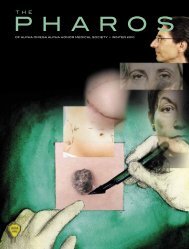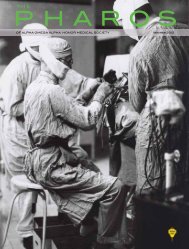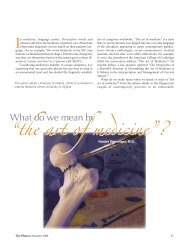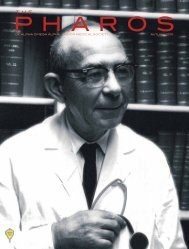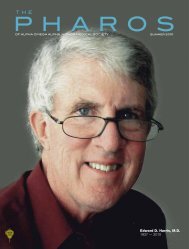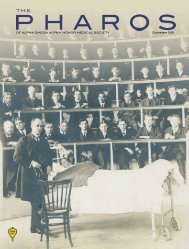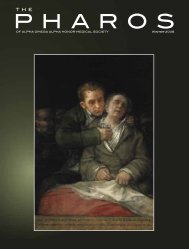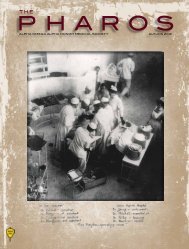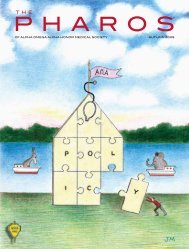4 - Alpha Omega Alpha
4 - Alpha Omega Alpha
4 - Alpha Omega Alpha
You also want an ePaper? Increase the reach of your titles
YUMPU automatically turns print PDFs into web optimized ePapers that Google loves.
HIV- positive, like everyone, paralyzed from the waist<br />
down from a tuberculosis infection in his spine. By the time<br />
Philipo came to us he had already spent months immobilized<br />
in bed, and the sore across his lower back was as large as a<br />
compact disc, and exposed the lower rungs of his spinal column<br />
and his pelvic bones. Every day I clean the dead tissue<br />
away. I almost fainted the first time I did it. I felt the temperature<br />
rise in the room. A bead of sweat gathered on my<br />
forehead and I watched it run down over my eye and gather<br />
again at the end of my nose. I leaned forward, and when that<br />
didn’t feel right I leaned backwards, collapsing onto the bed<br />
behind me where I was able to grab my breath and regain my<br />
composure. Since then I have been able to work quickly and<br />
confidently in tending his wounds—more sores on each hip<br />
also expose the heads and insertion of his femurs.<br />
In the last week, Philipo has begun to regain feeling in his<br />
back. I hoped he would die before it fully returned. His wife<br />
stopped visiting him, his children never came. He looks at<br />
pictures in my National Geographic while I work on him and<br />
he points at things he’s never seen before, places he would<br />
like to go. I like Philipo and I care about him, but we are unable<br />
to speak to each other. Even with his little English, and<br />
my little Nyanja, we are never really connecting with each<br />
other. Even with perfect communication I think I would not<br />
know what to say.<br />
Rearranging bodies in the morgue<br />
I am already dressed so it is easy to slip out of bed and<br />
away from Sarah to head back to the clinic. Philipo doesn’t<br />
weigh anything but he is tall, and even with both of us it is a<br />
little difficult. The nurse helps me move him out of his bed,<br />
across the dirt courtyard, and onto the floor of the morgue.<br />
The women there wail even louder as we walk by with Philipo<br />
wrapped in his own bed sheet. The nurse leaves me and<br />
heads back to the clinic, closing the door behind her, muting<br />
the shrill shrieking from outside and leaving me instead with<br />
the deafening silence of the cooler and its inhabitants.<br />
When I open the bottom drawer I am not surprised to see<br />
the top of a dark head facing me out of the void. The second<br />
drawer is also taken. The third drawer is full. I hate when this<br />
happens. Now I have to reach in and rearrange the bodies.<br />
I have to push one of the bodies up against the side of the<br />
drawer and then I will have to shove in Philipo, a little bit at<br />
a time.<br />
His legs dangle and drag on the floor. Alone with me in the<br />
dim light he feels heavier than he did crossing those hundred<br />
feet. The body already on the drawer rocks over when I am<br />
halfway done and bottlenecks any progress. I practically have<br />
to climb over Philipo to push the other body away, and then<br />
it is a continuous balance to keep the one from overturning<br />
the other. Philipo feels soft, and even a little warm. He smells,<br />
By and about Gabriel Cade<br />
I was raised on a small goat farm in<br />
the mountains of North Carolina where<br />
my father was a family physician and<br />
my mother an ICU nurse. To avoid a<br />
hereditary career in medicine, I dropped out of college<br />
and wandered, walking 2200 miles along the<br />
Appalachian Trail, waiting tables and writing for a<br />
newspaper in Hollywood, climbing rocks and rafting<br />
in New Zealand, and fighting sand fleas and strangers<br />
on “Survivor: Marquesas.” A disjointed collection<br />
of skills and experiences ultimately led to Zambia,<br />
where I worked with my twin sister in a small AIDS<br />
hospice and orphanage. The experiences in Zambia<br />
and other parts of Africa convinced me to return<br />
to finish my undergraduate education and pursue a<br />
medical degree at the University of North Carolina at<br />
Chapel Hill School of Medicine.<br />
well, like Africa, like dirt and work and sunshine and dry<br />
grass and death. He makes the body next to his seem even<br />
more repulsive than usual. It is cold and clammy and stiff, and<br />
smells only like death.<br />
In this moment, I realize that the capacity of the morgue<br />
to comfortably house death has been tied to the capacity of<br />
my own heart to do the same. I realize I am so sick of death.<br />
I am so sick of it. I even try to throw it up, to purge myself of<br />
the aching in the pit of my stomach. I even try to scream. I try<br />
my own wailing to trounce the sorrow and pain around me.<br />
Nothing comes. There’s nothing there. I already feel so emptied<br />
by this work, by this never-ending work. I don’t want to<br />
see any more death. I don’t want to wait for any more patients<br />
to die. I don’t want to be there to help move the body.<br />
Philipo’s legs still stick out of the cooler. It looks grotesque.<br />
I yell at the four bodies. I won’t give them tears, just anger. I<br />
am so angry at them all for dying and leaving me to deal with<br />
their death. I’m angry that when I do sleep I dream of bodies<br />
piled on bodies, and that when I look at patients still alive in<br />
the clinic I can close my eyes and see them dead. I hate that<br />
the dead cling to the inside of my eyelids. I’m so angry that I<br />
can’t do anything to stop it and that, no matter how angry I<br />
get, I will just have to do this again tomorrow night.<br />
When I am home, someday, back in my home in America,<br />
am I going to wake up expecting that rap on my window?<br />
Am I going to sleep again and dream again?<br />
The author’s address is:<br />
118 Milton Avenue<br />
Chapel Hill, North Carolina 27514<br />
E-mail: gcade@med.unc.edu<br />
The Pharos/Spring 2009 15



